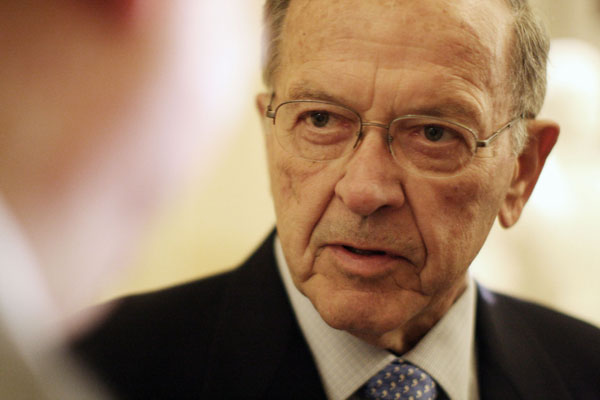The Stevens Effect
Move over ’Bradley effect,’ this election saw the birth of a new poll phenomenon. It looks like voters didn’t want to admit to supporting their senator, a convicted felon. But the vote proves that they did.
Jul 31, 2020130.4K Shares1.9M Views
Sen. Ted Stevens (R-Alaska) (WDCpix)
Move over “Bradley effect,” this was the year of a different polling phenomenon — the “Stevens effect.”
Down in the polls last week by 22 points, Alaska’s Sen. Ted Stevens now leads by 3,500 votes with 40,000 absentee ballots still to be counted.
In the final days of the Senate campaign, many voters swung away from Stevens when news broke that he had been convicted of seven counts of corruption-related felonies on Monday in Washington.
Image has not been found. URL: http://www.washingtonindependent.com/wp-content/uploads/2008/08/politics.jpgIllustration by: Matt Mahurin
The federal indictment had already taken its toll on Stevens. He had been hugely popular in Alaska and won each of his seven terms handily. But, he was in a dead heat in early October, and then dropped 8 points in the polls last Tuesday, the day after his conviction. By Thursday, Stevens was 22 points behindhis competitor Anchorage Mayor Mark Begich.
But despite surveys showing Alaskans were going to abandon the 84-year-old senator, in the privacy of the ballot box many stood by him. Stevens, the longest serving Republican senator of all time, is credited with using his seniority in Washington to bring home billions in federal dollars, which support 40 percent of all jobs in the state he has said.
Stevens is also rightly credited with ushering the state into the modern era. Federal dollars built the state’s roads and highways, for residents do not pay state income or property taxes. Voters said they wouldn’t vote for a felon, but on Election Day constituents remembered the Stevens of the last 40 years.
A number of factors help explain the discrepancies between what was predicted and what happened, including the theory that many voters would simply not admit to pollsters they planned to vote for a candidate just convicted of a crime.
“It actually makes sense to me,” said Julian E. Zelizer, a Princeton history professor who has focused on congressional history, referring to voters saying they wouldn’t vote for Stevens. “It’s embarrassing to make that admission.”
The idea is similar to the much-discussed, though debunked, theory of the Bradley effect — named for former Los Angeles Mayor Tom Bradley who lost a bid for California governor in 1982, though exit polls had showed him winning. Political analysts speculated this year that some white voters might like to tell a pollster they support a black candidate, but not do so in the end.
Zelizer said it’s not surprising to see constituents stand by incumbents, who, like Stevens are seen as responsive overall.
“People can separate [scandal] from what a representative delivers,” Zelizer said. “I think that kind of shift in the electorate can be explained in pure interest.”
Voters in Alaska know that Stevens have brought home billions in federal dollars. Stevens said in a debate Thursday night that 40 percent of jobs in Alaska are funded, at least in part, by federal money.
“Virtually everyone in the state is directly or indirectly beholden to Sen. Stevens in terms of the federal dollars,” said Steven Haycox, a history professor at the University of Alaska, Anchorage. “When people get into the voting booth they remember these guys have delivered for Alaska.”
Haycox said that job-security is always a voter issue in Alaska because the state’s economy is so narrow.
Rep. Don Young (R-Alaska), the state’s lone congressman, confronted a similar situation. He was expected to lose to his competitor, Ethan Berkowitz, by a solid margin just last week.
Young’s problems started about a year ago when it was revealed he is under federal investigation for ties to the same company that caused Stevens’ legal troubles. Young has spent over $1 million dollars on legal expenses in the last year, though he has not been indicted.
Despite being down in the polls by about 9 points in the run-up to the election for his 19th term in office, Young won Tuesday night by an 8-point margin.
“Pollsters can be pollsters and sit in their little offices,” Young said, “but I never really believe what they say until the day after the election. That’s really, the main, only poll that’s necessary.”
But whether voters consciously chose to mislead pollsters is up for debate.
“You’d be talking about tens of thousands of people out there saying one thing and then doing something else,” said prominent Anchorage pollster Ivan Moore.
Moore said that the difference between polls and results, though, was not the result of a last-minute ad blitz winning over support.
“Opinion does not change that much that quickly,” Moore said. “Clearly, weird shit was going on.”
Moore said he thinks that the pollsters, himself included, got the numbers wrong because they sampled the wrong people.
He speculates that Gov. Sarah Palin’s presence on the ticket brought out her base of support, so more Republicans voted than usual. Those numbers may not be known for several months.
“I’m just encouraged,” Moore said, “ that not only did I get it wrong, but everybody got it wrong.”

Rhyley Carney
Reviewer
Latest Articles
Popular Articles
